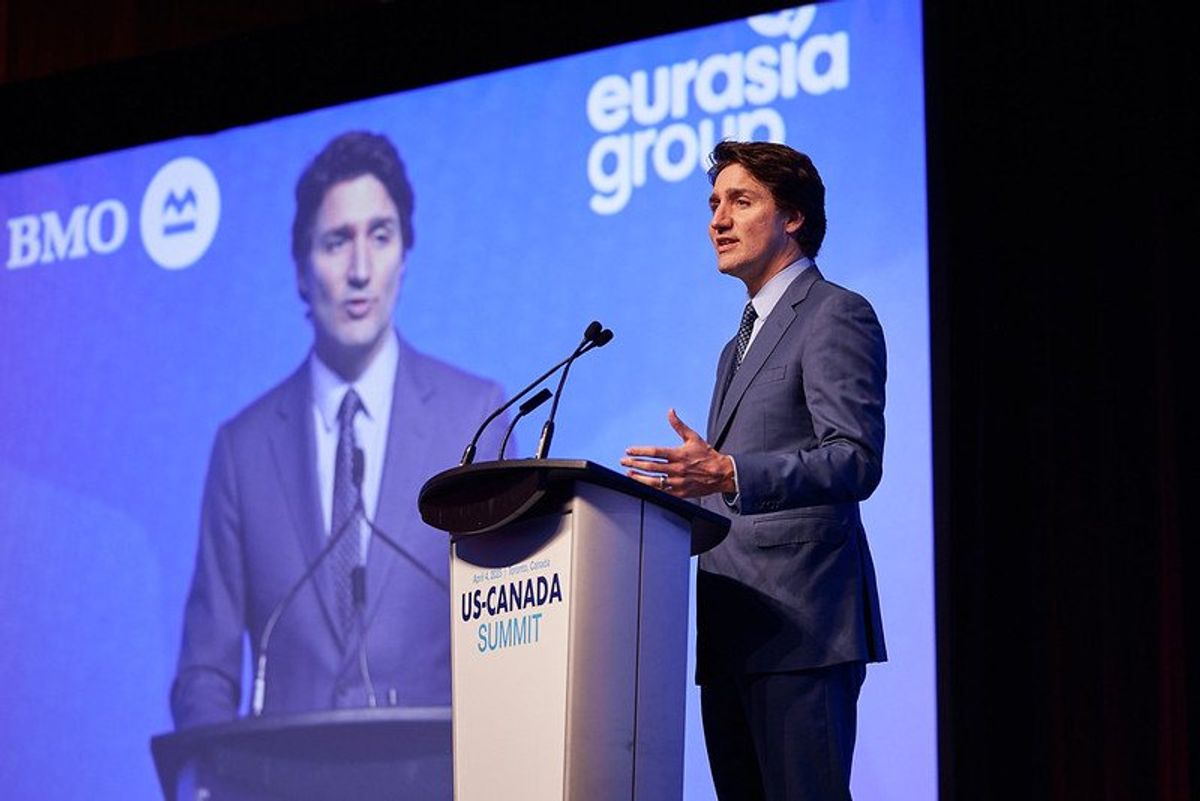Security and defense. Energy and critical minerals. Economic growth and recession fears. Sustainability and space. These were just some of the issues that over 500 people debated and discussed in Toronto at the first annual US-Canada Summit presented by BMO, Eurasia Group, and GZERO Media last week.
One of our partners, the Munk School of Global Affairs and Public Policy, put together the following summary of events.
________________________________
Report by the Munk School’s Marie Ascencio, Giancarlo Da-Ré, Matthew Funk, David Jones, Emma Martin, Pierre Sarlieve, and Anastasia Triadafilopoulos
On April 4, 2023, the Bank of Montreal (BMO) and Eurasia Group hosted the inaugural US-Canada Summit in Toronto. Scheduled amid a backdrop of rising geopolitical tensions, the day-long event acquired even greater significance in light of President Biden’s recent visit to Canada and the release of Canada’s 2023 federal budget. It was an opportunity for North American leaders from the public and private sectors to further strengthen a shared commitment to allyship in the midst of the opportunities and challenges facing the two countries.
The summit provided a platform for in-depth analysis of key policy areas, including the clean energy transition, infrastructure, economics, trade and international relations, space and security, technological innovation, and geopolitical risk. In order to foster meaningful outcomes, as GZERO Media’s Evan Solomon emphasized, it was vital for the summit to focus on substantive, candid discussions among decision-makers. In this respect, the summit delivered. The line-up featured a “heavyweight” collection of current and former ministers, ambassadors, corporate leaders, and others, including Prime Minister Justin Trudeau.
In the summit’s concluding address, the PM underscored the importance of creating durable jobs in the clean energy sector and emphasized the opportunity for the US-Canada partnership to boost economic growth and international security through robust, resilient supply chains. He discussed the significance of policies that support working Canadians, while also casting a critical eye on actions taken by Russia and China. He concluded with a statement that encapsulates the interconnected nature of today’s geopolitical landscape: "Security policy is economic policy is environmental policy."
On any other day, a discussion involving Canada’s Minister of Innovation, Science, and Industry François-Philippe Champagne, and US Sen. Chris Coons might have been the highlight. Even still, their conversation left a lasting impression. The commitment to strengthening US-Canada partnerships was evident, as both leaders emphasized the importance of establishing integrated supply chains across North America to bolster resilience against geopolitical threats. Sen. Coons got it right when he joked that Minister Champagne was the “Minister of Innovation, Science, and Enthusiasm.”
For Canada, in particular, the summit offered critical insights and takeaways:
80% similar or 20% different?
Former Canadian Ambassador to the US Gary Doer shared a thought-provoking phrase: When two entities have 80% in common, it makes them 80% similar, not 20% different. This outlook can help guide the US and Canada through challenging periods, but at times it may be difficult to follow fully.
A number of panelists acknowledged fundamental differences between Canadian and US approaches on issues like the banking sector, carbon pricing, immigration, and the broader political climate. It is important to recognize, however, that these differences also highlight the comparative advantages that each nation possesses, with strengths that complement one another. Despite clear intentions to strengthen the US-Canada partnership, some differences between the two countries will inevitably remain. Collaborative efforts will need to take into account this diverse policy landscape, leveraging the unique strengths of each nation to build a more resilient and prosperous future together.
Short-termism
A recurring hurdle to strengthening the Canada-US bilateral relationship is the mutual tendency toward short-termism. Companies have a tendency to focus on their quarterly results and politicians on both sides of the border focus on election cycles. To elevate the Canada-US relationship, they both must work hard to shift their focus to addressing macro-level concerns and protecting collective future interests.
Time to step up
There was a recurring sentiment, both implicitly and explicitly, urging Canada to “step up” to expand its role within supply chains and manufacturing. Even President Biden recently alluded to this, suggesting that Canada might be most comfortable just mining materials for electric vehicle batteries, leaving actual battery production and assembly to the US. The summit conveyed Canada’s eagerness to assume a larger role, as exemplified by GM Canada's President and Managing Director Marissa West, who highlighted Canada's desire, capacity, and preparedness to undertake end-to-end battery manufacturing. However, a number of panelists also stressed the need for Canada and the US to work together within competitive markets. Therefore, if Canada seeks to secure a more prominent position in the global production landscape, it will have to demonstrate its capabilities and competitiveness in the face of market opportunities.
Much-needed infrastructure
Bureaucratic "red tape" was identified as a significant obstacle to effective public and private sector delivery, such as in mineral mining. Greg Ebel, CEO of Enbridge Inc., underscored the consequences of a lack of energy infrastructure, which has contributed to soaring electricity costs and the “missed opportunity” of liquified natural gas exports to Asian buyers. The blame was placed squarely on permitting issues. Several references were also made specifically to Canada, such as the relatively low level of renewable generation within electricity grids on the Prairies. Calls were made for more carrots in the Canadian regulatory ecosystem to counterbalance the sticks holding back infrastructure development.
The clean economy
It is crucial to emphasize the pressing need for a rapid transition to a low-carbon future. The significance of this issue was underscored by Catherine McKenna, the former Minister of the Environment and Climate Change, and Katherine Hayhoe, Chief Scientist at The Nature Conservancy. Both stressed that climate change will have far-reaching consequences.
To analogize the need for greater dedication and grit in our climate ambitions, McKenna referenced 16-year-old swimmer Summer McIntosh’s extraordinary recent results, breaking her second world record in just four days at the recent Canadian trials. As McKenna noted, there will be some difficult days ahead, but there also will be ones on the climate file where huge strides are made.
The UN High-Level Expert Group, which she chairs, recently released the report, “Integrity Matters: Net Zero Commitments by Businesses, Financial Institutions, Cities and Regions,” which highlighted the need to maintain momentum across each sector.
Challenges ahead
Former US Ambassador to Canada Bruce Heyman warned that Canada may face political risks and challenges in the near future. As the 2024 presidential race approaches, both Democrats and Republicans will be pressing the “Buy American” button. This protectionist pressure is understandably concerning for Canadians. But, as former Ambassador Heyman reassured, “this too shall pass.”
Canadians need to be patient and observe the difference between campaign rhetoric and government. This echoes Canadian worries about the Inflation Reduction Act. US Ambassador to Canada David Cohen advised that it is important to wait until the end of legislative processes before casting judgment. Nonetheless, this political risk will require the best attention and diplomatic acuity of Canadian officials.
Moving forward: opportunities and optimism
It is noteworthy that the US-Canada Summit will reconvene annually. This presents an opportunity to establish continuity and spur action. In the meantime, summit organizers should seek to collaborate with current officials, in addition to attendees, to integrate the summit's perspectives into existing official governance channels like a newly created Joint Energy Transformation Taskforce. As Canada and the US grapple with the delicate balance between competition and collaboration, the insights gleaned from these conversations should prove invaluable.
In the future, Indigenous voices may take a larger role. Mark Podlasly, Chief Sustainability Officer of the First Nations Major Project Coalition, noted that the summit was characterized by limited Indigenous representation. Podlasly underlined that Indigenous peoples discuss the same issues as at the summit and he pointed out that, in a North American context, Indigenous peoples can further strengthen US-Canada relations.
Many speakers acknowledged the importance of collaborating with Indigenous peoples when making policy decisions. By incorporating Indigenous perspectives into discussions, economic partnerships and shared visions for a sustainable future can be developed more inclusively, leading to more effective and equitable policy.
The underlying message of the summit was that there is a once-in-a-generation opportunity for Canada and the United States to deepen their relationship. Certainly, there are pressures to backslide. But, as Canada’s Ambassador to the US Kirsten Hillman suggested, forging economic partnerships that make reversals not just undesirable, but expensive, would be a wise approach.
So, should we feel optimistic or pessimistic about the future of Canada-US relations?
The majority of panelists were optimistic. The complementary strengths of both countries mean that, when working together, we can achieve great things. Canada and the US can secure a more prosperous future for North America. But this can be realized only by strong collaborative leadership in the midst of turbulent global times.



















